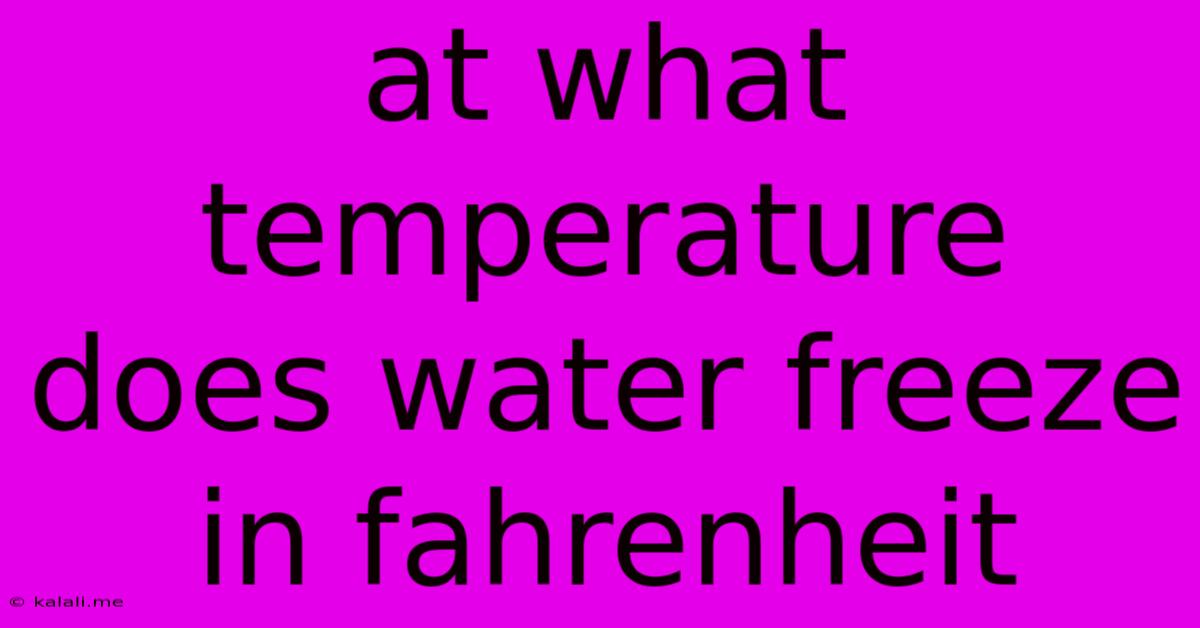At What Temperature Does Water Freeze In Fahrenheit
Kalali
Jun 14, 2025 · 3 min read

Table of Contents
At What Temperature Does Water Freeze in Fahrenheit? A Deep Dive into Freezing Points
Meta Description: Discover the exact temperature at which water freezes in Fahrenheit, plus explore the science behind freezing points and factors that can affect this crucial transition. Learn about supercooling and why knowing the freezing point of water is essential.
Water, the elixir of life, undergoes a fascinating transformation when its temperature drops below a certain point: it freezes. But at precisely what temperature does this occur in Fahrenheit? The answer is a seemingly simple one, yet understanding the nuances behind it reveals a captivating world of physics and chemistry.
This article delves into the freezing point of water in Fahrenheit, exploring the science behind this phase transition, factors that may influence it, and the practical implications of this fundamental property of water.
The Freezing Point of Water: 32°F
The universally accepted freezing point of water at standard atmospheric pressure is 32 degrees Fahrenheit (0 degrees Celsius, 273.15 Kelvin). This is the temperature at which liquid water transitions into its solid state, ice. This seemingly simple fact underpins countless processes, from weather patterns to industrial applications.
Factors that Can Affect the Freezing Point
While 32°F is the standard, several factors can subtly influence the freezing point of water:
-
Pressure: Increased pressure lowers the freezing point of water, a phenomenon crucial in processes like ice skating. The pressure exerted by the skater's blades momentarily lowers the melting point of the ice, creating a thin layer of water that reduces friction.
-
Impurities: Dissolved substances, like salt, lower the freezing point of water. This principle is utilized in de-icing roads and sidewalks during winter. The salt lowers the freezing point of the water, preventing ice formation or melting existing ice.
-
Supercooling: Under specific conditions, water can remain liquid even below 32°F. This phenomenon, known as supercooling, occurs when water is exceptionally pure and free of nucleation sites (surfaces that facilitate ice crystal formation). The water remains in a metastable state until disturbed, at which point it rapidly freezes.
Why is Knowing the Freezing Point Important?
Understanding the freezing point of water is paramount in various fields:
-
Weather Forecasting: Accurate prediction of freezing temperatures is crucial for weather forecasting, enabling timely warnings about potential hazards like icy roads and frost.
-
Agriculture: Farmers rely on knowledge of freezing temperatures to protect crops from frost damage. Techniques like frost protection with irrigation systems leverage the principles of freezing point depression.
-
Infrastructure: Engineers account for the freezing point of water in designing structures, ensuring they can withstand the expansion of water as it freezes.
-
Food Preservation: Freezing is a common method of food preservation, relying on lowering the temperature of water within food items to inhibit microbial growth.
-
Chemistry and Physics: The freezing point of water serves as a reference point in numerous scientific experiments and calculations.
In conclusion, while the freezing point of water in Fahrenheit is a seemingly simple concept – 32°F – a deeper understanding reveals a complex interplay of physics and chemistry. The influence of pressure, impurities, and the phenomenon of supercooling highlight the intricate nature of this fundamental property, crucial across diverse scientific and practical applications.
Latest Posts
Latest Posts
-
Difference Between Pcr And Dna Replication
Jun 14, 2025
-
Which Of The Following Is Not True About Voip
Jun 14, 2025
-
What Is The Opposite Of Advocate
Jun 14, 2025
-
What State Of Matter Has The Most Kinetic Energy
Jun 14, 2025
-
An Oxygen Atom Has How Many Valence Electrons
Jun 14, 2025
Related Post
Thank you for visiting our website which covers about At What Temperature Does Water Freeze In Fahrenheit . We hope the information provided has been useful to you. Feel free to contact us if you have any questions or need further assistance. See you next time and don't miss to bookmark.